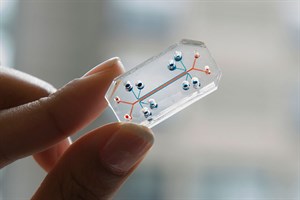Texas A&M Center Secures Funding To Continue Tissue Chip Testing And Promotion

Following the completion of their first two years of comprehensive, independent testing of 11 tissue chips, researchers in the Tissue Chip Validation Center at Texas A&M University (TEX-VAL) have been successful in securing a competitive renewal award from the National Institutes of Health (NIH).
The competitive, multi-million-dollar grant from the NIH’s National Center for Advancing Translational Sciences (NCATS) will facilitate the creation of a public-private partnership that builds on the existing infrastructure and expertise of TEX-VAL and promotes the use of tissue chips by industry and regulatory bodies. The center also will continue their work to validate the tissue chip technology developed by their partners at a number of public and private academic centers in the United States.
Led by Texas A&M College of Veterinary Medicine & Biomedical Sciences (CVM) professor Ivan Rusyn, the TEX-VAL Center will work with key members of the Innovation and Quality, or iQ, Consortium, comprising toxicologists from pharmaceutical companies that are interested in exploring the use of tissue chips for drug testing and development.
The TEX-VAL Center has secured commitments to test 19 new tissue chips from NIH-funded developers, as well as an interest in discussing the consortium framework from key members of the iQ Consortium and governmental agencies.
“We have already been successful in building close partnerships with the academic laboratories that develop tissue chip technology. I am delighted that our center brings value to our partners and that they are happy to continue working with us,” Rusyn said. “The major focus for this second, two-year grant is to engage even more closely with companies, as a group or individually, and government agencies to build a consortium that becomes a place where people can discuss their experiences with the technology, but also can actually do new testing and then share this information with others.”

The ultimate goal is to establish a public-private partnership that will transform the TEX-VAL Center into a self-sustaining public-private consortium for tissue chip validation.
“As happens with many novel and complex technologies, industry and regulatory agencies have been slow to adopt tissue chips because of a lack of confidence in the reliability and relevance,” Rusyn added. “The consortium will work to encourage tissue chip adoption and serve as a practical pathway to what we hope will be the eventual replacement of animal testing in the future.”
Other TEX-VAL Center investigators are: Weihsueh Chiu at the CVM; Clifford Stephan at the Texas A&M Institute of Biosciences and Technology; Terry Wade with the Texas A&M Geosciences and Environmental Research Group; and Arum Han at the Texas A&M College of Engineering.
Additional information on the award (U24 TR002633) is available via the NIH Project Reporter, at https://projectreporter.nih.gov/project_info_description.cfm?aid=9671095&icde=41336148.
###
For more information about the Texas A&M College of Veterinary Medicine & Biomedical Sciences, please visit our website at vetmed.tamu.edu or join us on Facebook, Instagram, and Twitter.
Contact Information: Megan Palsa, Executive Director of Communications, Media & Public Relations, Texas A&M College of Veterinary Medicine & Biomedical Science; mpalsa@cvm.tamu.edu; 979-862-4216; 979-421-3121 (cell)


